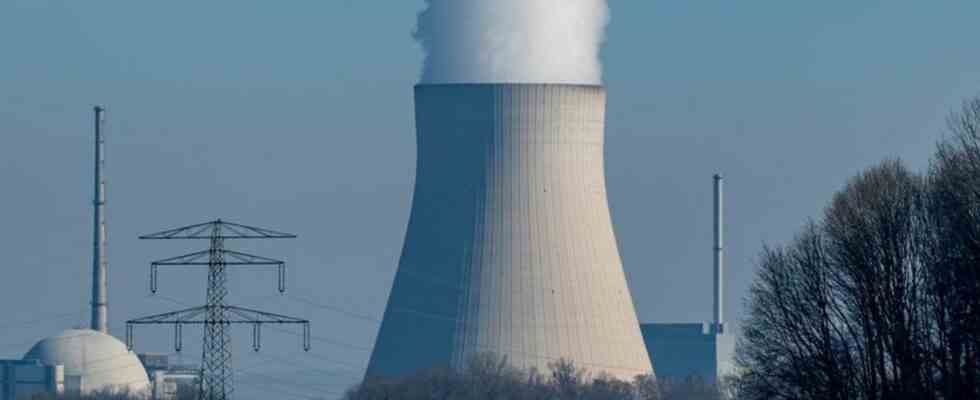energy
Traffic light government argues about continued operation of Akw
According to current legislation, the nuclear power plant must be shut down by the end of 2022 at the latest. Photo: Armin Weigel/dpa
© dpa-infocom GmbH
At the end of the year, the three remaining nuclear power plants in Germany are to be taken off the grid. Does that make sense given the current situation? The topic causes controversy in the traffic light coalition.
The traffic light coalition is increasingly arguing about longer operating times for the three remaining nuclear power plants in Germany. On Tuesday, the Greens rejected a proposal by FDP parliamentary group leader Christian Dürr. Union politicians have also been calling for nuclear power plants to be allowed to run beyond the end of the year because of an impending gas shortage. Environmental groups, on the other hand, spoke of a “sham debate”.
Gas has not been delivered via the Nord Stream 1 Baltic Sea pipeline since Monday due to maintenance work. This usually takes up to ten days. However, because of the Ukraine war and the Western sanctions against Russia, there is now great concern that the gas tap could remain closed.
“It can happen that after the maintenance work on Nord Stream 1, no more gas flows,” said FDP faction leader Dürr of the German Press Agency. Russian President Vladimir Putin does what he wants. It would hardly be surprising if he were to use technical reasons to finally turn off the gas tap. “We don’t want to paint the devil on the wall,” said Dürr. “But we have to prepare for a scenario that could have far-reaching consequences for private households and German industry. Not a cubic meter of gas should have to be converted into electricity. It would therefore be right now to extend the operating times of the nuclear power plants beyond the winter.”
SPD leader Saskia Esken called longer terms for nuclear power plants from energy, economic and
from a security policy point of view «completely nonsensical». These power plants supplied electricity and no heat, Esken told the “Süddeutsche Zeitung” (Wednesday). In order to replace gas-fired power plants, there are “more flexible and safer alternatives”. “Nuclear power is uneconomical, highly dangerous and has no future,” added the SPD leader.
The leader of the Greens, Katharina Dröge, also rejected the FDP’s demand. “The debate about extending the lifetime of nuclear power plants is a sham debate,” she told the newspapers of the Funke media group. “Because of course the supporters of nuclear energy also know that the three remaining nuclear power plants cannot make any significant contribution to securing the gas supply.” There would also be safety risks and the lack of fuel rods. Dröge accused the Union of wanting to distract from its own mistakes, such as its one-sided dependence on Russian gas. “What really helps now are measures to reduce energy consumption and increase energy efficiency. It takes a joint effort to do that.”
According to current law, the three nuclear power plants Isar 2, Emsland and Neckarwestheim 2 must be shut down by December 31, 2022 at the latest. Economics Minister Robert Habeck and Environment Minister Steffi Lemke (both Green) advised against longer operating times for nuclear power plants in a test report in March. It was said at the time that a small contribution to the energy supply would be opposed to major economic, legal and safety risks.
Extension probably has no effect on the coming winter
An extension of the running times of the nuclear power plants still in operation would not bring any additional amounts of electricity in the coming winter, it was said – but at the earliest from autumn 2023 after refilling with newly manufactured fuel rods. The three nuclear power plants represent around 5 percent of Germany’s electricity production. The three operators of the plants have also rejected extensions to the service life.
However, the CDU chairman Friedrich Merz appealed to the Greens to agree to the further use of nuclear power in Germany. «Dear green ones, jump over your shadow. No bans on thinking. Do it for Germany,” Merz wrote in an article for the “Bild” newspaper. In view of the energy crisis, “we shouldn’t take the opportunity to keep our power plants running in order to save gas in power generation”. The Union also wants an “early end to the old nuclear power” – but not now.
CSU regional group leader Alexander Dobrindt told the “Bild” newspaper: “Putin is turning off gas for Germany and the Greens for us nuclear power. That almost provokes the blackout in winter.”
Criticism of “sham debate”
The SPD parliamentary group referred to statements by parliamentary group leader Matthias Miersch, who said a few weeks ago in the “taz”: “We don’t need any sham debates about extending the life of nuclear power plants. What is needed are real solutions to overcome the gas crisis.” Sascha Müller-Kraenner, Federal Managing Director of the German Environmental Aid, told the dpa: “We don’t have an electricity problem, we have a heat problem.” The contribution of gas-fired power plants to electricity generation is manageable. “This is a complete bogus debate.”
Last week, the Bundestag and Bundesrat cleared the way for temporarily using more coal-fired power plants to generate electricity. This is intended to save gas and store it instead. An amendment by the Union parliamentary group, which aimed to extend the lifetime of nuclear power plants, was rejected in the Bundestag.

